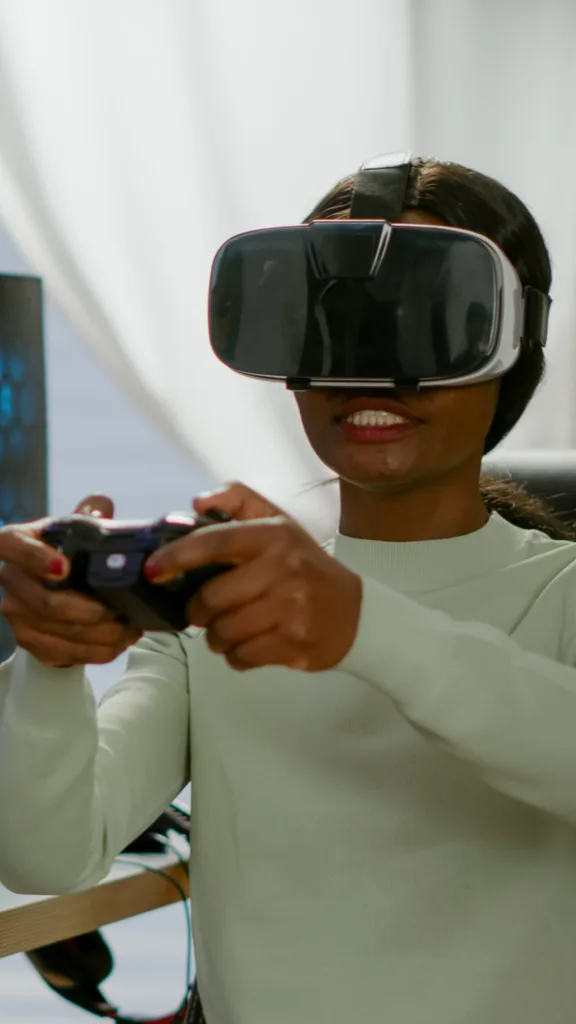When you purchase through links on our site, we may earn an affiliate commission. This doesn’t affect our editorial independence.
AI in the gaming industry refers to the use of artificial intelligence to create intelligent behaviors in non-player characters (NPCs). This is how AI is changing the gaming industry.
AI has changed video games forever. That’s not hyperbole – just fact. From the way enemies behave to how entire worlds are created, artificial intelligence has worked its way into nearly every aspect of modern gaming. But what does that actually mean for games? And why should anyone care?
The Impact of AI on Video Games
When people hear ” AI in games,” they often imagine super-smart computer opponents. That’s part of it, but honestly just the tip of the iceberg. Game AI isn’t really about creating true intelligence. It’s about creating the illusion of intelligence – making characters and systems that seem smart enough to be believable without needing to pass a Turing test. The early stuff was laughably simple. Remember when enemies would just run straight at you? Or when “adaptive difficulty” meant enemies got more health and did more damage? We’ve come a long way.
Generative AI: Changing the Way Games are Developed
Generative AI, a subset of AI, has emerged as a game-changer in the field of game development. Game development is HARD. It takes forever. It costs a fortune. And most games still fail commercially. Enter generative AI – basically algorithms that can create new content based on patterns they’ve learned. And boy have they learned a lot. Does this mean computers are making our games now? Not quite. Think of generative AI as a super-powered assistant rather than a replacement for human developers. It handles the grunt work, the repetitive stuff, the things that used to take forever but didn’t really need a human touch.
the following are ways in which generative AI is transforming the gaming landscape:
1. Procedural Content Generation (PCG)
Procedural generation isn’t new – roguelikes have used it forever. But the OLD way was just randomizing placement of pre-made pieces. Modern procedural generation understands CONTEXT. Today’s procedurally generated worlds make sense. Mountains have proper erosion patterns. Villages appear where they logically would – near water, at crossroads, etc. Ecosystems transition naturally. The difference? Old procedural generation was basically rolling dice. New procedural generation has actually learned what makes environments feel natural and believable.
2. AI-Driven Non-Playable Characters (NPCs)
I’m so tired of games where you can murder someone’s friend and then immediately ask them for a quest. Like, hello? Your buddy’s corpse is RIGHT THERE. Modern NPCs track relationships, remember interactions, and sometimes even gossip among themselves. They’ll remember if you helped them, hurt them, or ignored them completely. Is it perfect? No. But it’s WAY better than the “talk to NPC, get quest, NPC stands in same spot forever” pattern we’ve had for decades.
3. Game Testing and Bug Detection
Game bugs are inevitable. There are just too many possible player actions to test them all… or there used to be. AI testing tools now play through games thousands of times, deliberately trying weird stuff to see what breaks. Jump while crouching and firing your weapon while switching items? An AI tester will try it, even though no human would. This doesn’t catch everything – that’s why day 1 patches still exist. But it’s catching a lot more of the weird edge cases that used to slip through.
4. Game Conceptualization and Design
Game designers often get stuck in ruts, rehashing the same ideas. AI design tools help break out of those patterns by suggesting combinations humans might not think of. This isn’t about replacing creative directors – it’s about giving them tools to explore possibilities faster. Think of it like a brainstorming partner who’s analyzed thousands of games and can suggest unexpected combinations.
5. Natural Language Processing for Conversational NPCs
Dialog in games has been stuck in the “dialogue tree” model forever. You know – pick option A, B, or C, and the NPC responds accordingly. Natural language processing is FINALLY starting to break us out of this. Some games now let you type what you want to say, with NPCs responding to the general intent rather than exact phrasing. It’s still evolving, and sometimes it fails spectacularly. But when it works, it creates a much more natural flow of conversation.
6. Visual Enhancements
This one’s weird but true – games often look better a year after release than at launch. AI upscaling tools let developers enhance textures, improve lighting, and add details without rebuilding everything from scratch. It’s not magic – there are limits to what can be done. But it’s why that game you haven’t played in a while might genuinely look better when you reinstall it, even on the same hardware.
For all the AI advancements, games still need humans. Algorithms can generate content, but they struggle with purpose, meaning, and emotional impact. The best games use AI as a tool, not a replacement. They let the computers handle the tedious work while humans focus on the moments that matter – the plot twists, the emotional beats, the perfectly tuned boss fights.
Gaming AI will keep getting better, but don’t expect Skynet. The goal isn’t to create true artificial intelligence – it’s to create better GAMES. The real advances will come from better integration of these technologies. Imagine NPCs with memories AND natural language processing, in procedurally generated worlds that adapt to your playstyle. The future of gaming isn’t AI replacing humans – it’s AI and humans working together to create experiences that were previously impossible. Just don’t blame me when an NPC remembers you stole their sweet roll six months ago. That’s on you. And that is how AI is changing the gaming industry
